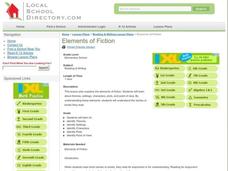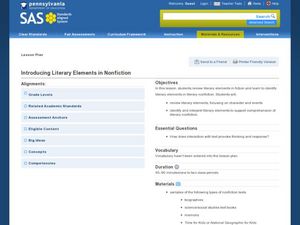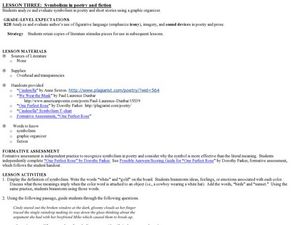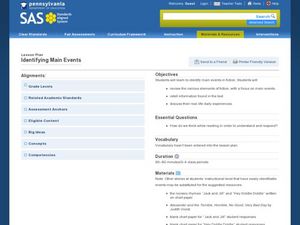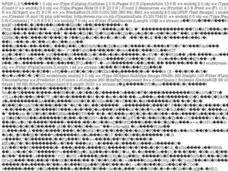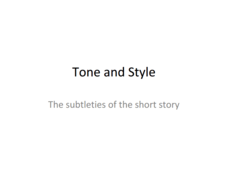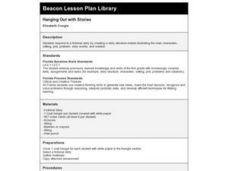Curated OER
Five Elements of a Story
Here’s a graphic organizer that permits learners to chart the introduction, rising action, climax, falling action and resolution of a story. The PDF file can be customized to work with any narrataive.
Curated OER
Elements of Fiction
Students identify key story elements in a fiction text. In this literacy activity, students are introduced to the various elements of fiction such as the setting, plot, and theme. Students read a short story of their choice and identify...
Curated OER
The Power of Fiction
Students explore fiction that moves individuals to social action. In this literature lesson, students read The Jungle by Upton Sinclair and analyze its literary worth as well as its investigative journalism. Students investigate other...
Curated OER
Comparing Themes Across Texts
Read various texts to compare the themes across each text. Learners write a journal entry describing the most beautiful scenery they've seen and use a map of the United States to locate the Sequoia National Park and Muir Woods. They then...
Curated OER
The Martian Chronicles: Concept Analysis
If you're planning on including Ray Bradbury's The Martian Chronicles in your science fiction unit, use a concept analysis guide to frame your instruction. It covers literary elements such as setting, narrative voice, and theme, as well...
University of North Carolina
Literature (Fiction)
An informative installment of the Writing for Specific Fields series helps readers learn how to interpret and write about fiction. The website details nine easy steps for writing a literary analysis—a useful method for all readers!
Curated OER
Analyzing Literary Devices
Eighth graders identify figurative language and poetry in this literary analysis lesson. Using Through the Looking Glass by Lewis Carroll and a YouTube video for "The Walrus and the Carpenter," young readers complete a literary device...
Pennsylvania Department of Education
Exploring Key Ideas and Details in Fiction and Nonfiction
Third graders participate in activities to differentiate fiction from nonfiction. In this fiction activity, 3rd graders describe the elements of a fiction story. Students compare and contrast fiction and non fiction elements. Students...
Curated OER
Thinking about Theme
Sixth graders explore theme in science fiction texts by examining how plot conflicts are resolved. This resource focuses on Madeleine L'Engle's A Wrinkle in Time, but the approach and guiding questions could apply to a variety of texts.
All for KIDZ
Building Relationships: The Orphan of Ellis Island
Family and friendship are two very important themes of the historical fiction novel The Orphan of Ellis Island by Elvira Woodruff. From video clips and writing prompts to reader's theater and family interviews, this resource provides...
Curated OER
Writing Short Stories: The Fun Way
Do your young authors suffer from writer's block when they try to write short stories? Access their natural creativity with C-Gor, the writing monster! The instructional activity takes aspiring authors through a new writing process...
Curated OER
Introducing Literacy Elements in Nonfiction
Explore nonfiction writing with your class. They will identify elements in nonfiction by reviewing elements of fiction. Then they use biographies, memoirs, menus, Time for Kids, and text books to identify elements of nonfiction. They...
Curated OER
Identifying the Theme in a Story
Students recognize Theme through the use of simple, short stories. Using Pro Quest, students begin by researching the literary element, theme, and how it can be identified. They then identify the themes in Aesop's Fables and other short...
Curated OER
Symbolism in Poetry and Fiction
Students examine the use of symbolism in literature. In this literary elements instructional activity, students discuss the attributes of symbolism. Students then read selected Cinderella stories and "The Fall of the House of Usher," and...
Curated OER
Identify and Analyze Literary Concepts
Students explore plot structure, conflict, setting, and mood. In this literary elements lesson, students read Rosa Parks, My Story and complete the provided plot outline worksheets. Students discuss the text elements of non-fiction pieces.
Curated OER
Identifying Main Events
Help kindergartners learn to identify the main events in fiction. They will review elements of fiction, retell information found in the text, and discuss their real-life daily experiences. All the while, they will be asking themselves...
Curated OER
Creating a Science Fiction Story
As the culminating activity in a unit study of science fiction, young writers demonstrate their understanding of the genre by producing their own graphic novel. After deciding on the main elements of their story, individuals use a comic...
Curated OER
Compare and Contrast Two Books
Help your middle school readers recognize the elements of fiction in two books. After reading and taking notes on the details of the books, they write an essay comparing and contrasting the two books. Use this lesson to emphasize...
Curated OER
Introduction To Literary Analysis
Explore the fascinating ways in which authors use specific literary devices to create interesting and realistic texts. Using non-fiction articles with the subject of rogue waves, an excerpt from The Perfect Storm, by Sebastian Junger,...
Curated OER
Pebbles, Sand and Silt -- Categorizing Fiction and Informational Books
Primary readers complete the activities in a Pebbles, Sand and Silt FOSS kit. As a class, they are given a group of rocks and they are to categorize them based on their activities in the FOSS kit. They use this information and apply it...
Curated OER
Tone and Style: The Subtleties of the Short Story
The elements of good writing are the focus of a presentation designed for short story writers. Included is advice from famous writers on how to develop a style, emphasize the tone of a story, utilize the predictable, and maintain interest.
Curated OER
Hanging Out with Stories
Help your class listen and respond to a fictional story by creating a story structure mobile illustrating the main characters, setting, plot, problem, story events, and solution. Using a coat hanger, they will create an artistic element...
Curated OER
Analyzing the Use of Irony in a Short Story
Ninth graders examine how literature connects to real-life and see how irony aids in the development of theme. They read Shirley Jackson's The Lottery, and discuss elements of foreshadowing and situational irony. Then learners will write...
Curated OER
Understanding Core Values Using the Frayer Model
Students complete the Frayer Model. In this literature lesson, students review the concept of theme in literature. Students identify major themes in books they've read. Students learn the attributes of the Frayer Model and then complete...



